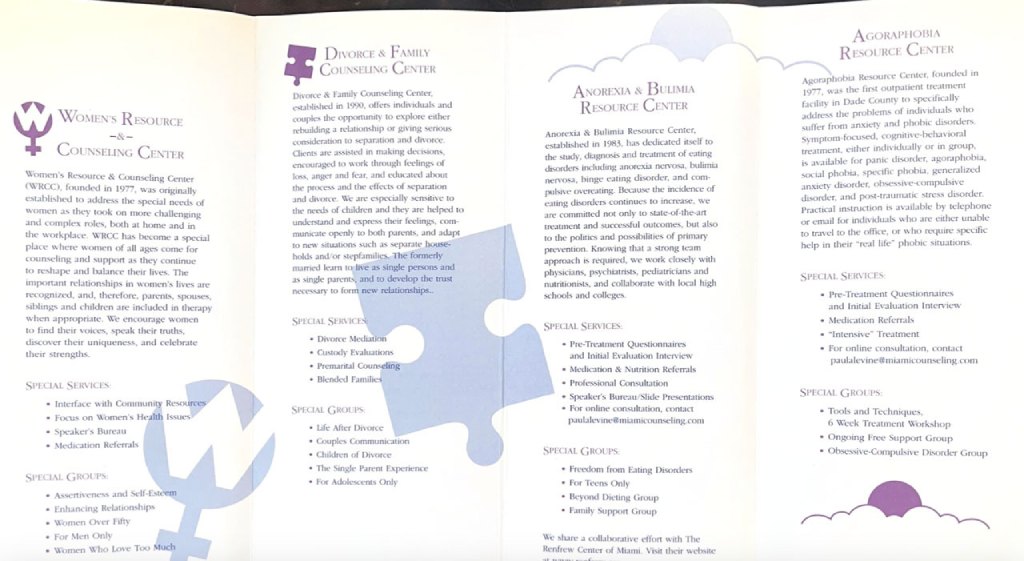We’ve been part of the Miami therapy community for a long time. Long enough to remember when mental health wasn’t something people talked about openly, and when specialty care often meant building something from scratch.
What would become MCRC didn’t begin as one unified center. It grew from the efforts of Susan Scholz-Rubin, Ph.D., and Paula Levine, Ph.D., two colleagues and longtime friends who saw what their community needed and built toward it.
The Early Work
Before the name Miami Counseling and Resource Center ever appeared on a sign, the practice was a constellation of smaller programs: the Women’s Resource and Counseling Center, the Agoraphobia Resource Center, the Anorexia and Bulimia Resource Center, and later, the Divorce and Family Counseling Center. Each one emerged in response to a gap in care and became a place where people could find real support.
The Women’s Resource and Counseling Center
Founded in 1977 by Susan Scholz-Rubin, Ph.D., the Women’s Resource and Counseling Center was created to meet the growing needs of women navigating complex roles at home and in the workplace. It became a space where women could talk honestly and work through life transitions. There was a speaker bureau, there were groups for women over 50 and for “women who love too much” and on assertiveness and self-esteem. The center recognized that relationships shaped many of these conversations and included partners, parents, or children in therapy when it helped support the work.
At its core, the center encouraged women to find their voices and take up space in ways that reflected their values. The work was relational, practical, and quietly transformative.
The Agoraphobia Resource Center
Also launched in the late 1970s, by Paula Levine, Ph.D., was the Agoraphobia Resource Center. It was the first outpatient clinic in Dade County to focus directly on anxiety and phobic disorders, offering cognitive-behavioral, skills-based support for people navigating panic, social fears, obsessive-compulsive patterns, and post-traumatic stress. The care was practical, grounded, and ahead of its time. For those unable to leave their homes, support was offered by phone—and eventually, even by email. The center also ran groups and extended workshops, helping people move toward lives that felt bigger and more possible.
The Anorexia and Bulimia Resource Center
Founded by Paula Levine, Ph.D., in 1983 and later co-directed by Susan Scholz-Rubin, Ph.D., the Anorexia and Bulimia Resource Center was one of the first outpatient centers in South Florida focused entirely on eating disorders. It brought together a team of therapists, psychiatrists, and nutritionists with a shared commitment to recovery, not just symptom reduction.
The work was holistic and forward-thinking. Clients had access to individual therapy, groups for parents and teens, nutrition support, and coordination with outside medical providers. There were even supervised meals on site! The approach was comprehensive, tailored, and quietly radical for its time: narrative therapy, hypnosis, EMDR, and spiritual work were all part of the toolbox.
But what stands out just as much as the treatment is the clarity of purpose. As one early flyer put it: how many more lives will be wasted pursuing thinness before we wake up to the harm? This center didn’t just treat eating disorders, it challenged the culture that fed them. Prevention was part of the mission from the start.
The Divorce and Family Counseling Center
“Your divorce hasn’t been easy on you, imagine what it’s like on your kids…”
Divorce is complicated, painful, and deeply emotional, not just for adults, but for the children watching it unfold. Susan opened the Divorce and Family Counseling Center in 1990 to help families navigate that reality.
The work wasn’t only about separation or staying together. It was about making space for grief, fear, and anger, while also offering practical guidance. Therapists supported parents in creating developmentally sound co-parenting plans, coached them on communication, and helped children make sense of the changes around them.
The center approached divorce not as a crisis to survive, but as a turning point to meet with intention and care. It offered a place to regroup, recalibrate, and redefine what family could look like moving forward.
Bringing It Together
By 1995, the mental health landscape was shifting. Managed care was changing how people accessed support, and we knew we needed to evolve. The individual centers came together under one umbrella: Miami Counseling and Resource Center.
The merger didn’t dilute what we had built, it preserved each center’s strengths while creating a shared structure for collaboration, continuity, and growth. For years, the original centers continued their work under the MCRC name. Over time, that umbrella became one integrated practice, multidisciplinary by design, with specialties that still reflect the programs that laid our foundation.
Growth, Transitions, and the Next Generation
In 2000, Susan’s son Kevin Scholz, Psy.D., joined the practice, bringing fresh perspective and a new generation of leadership. He was soon joined by his cousin, David Sandrow, Ph.D., who entered the field after a prior career on Wall Street. Together, they became co-owners in 2008—right at the start of the recession.
Economic uncertainty presented its challenges, but the heart of the practice remained steady. What sustained MCRC then, and continues to guide us now, is a dedication to clinical excellence, collaborative care, and deep roots in the Miami community.
Then and Now
Over the years, MCRC has welcomed psychologists, social workers, marriage and family therapists, mental health counselors, psychiatrists, and registered dietitians. While the team has grown and changed, the practice has always prioritized both clinical skill and the human connection that makes therapy meaningful.
Many clinicians who once trained or practiced here now lead successful careers across the city. We remain tremendously proud to have supported their growth, and continue to value the chance to collaborate with them as colleagues shaping the Miami therapy landscape.
Today, the practice offers individual therapy, couples therapy, psychiatric services and medication management, psychological testing, and support across life stages. Areas of expertise include eating disorders, family work, anxiety, trauma, grief, and more. It’s a place that still believes in what its founders knew to be true: healing is most effective when it’s both compassionate and expert. When it helps you find your way.
Thinking About Starting Therapy?
At Miami Counseling & Resource Center, you’ll find experienced, multidisciplinary providers who offer thoughtful, individualized care. We’re here to support you with expertise you can trust and a team that takes the time to understand what matters most to you.


